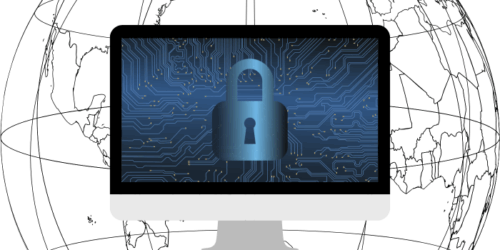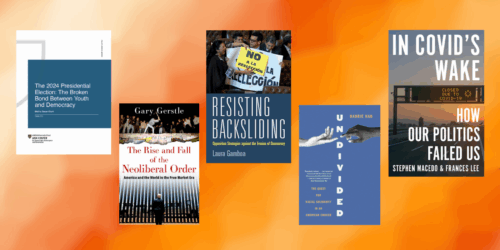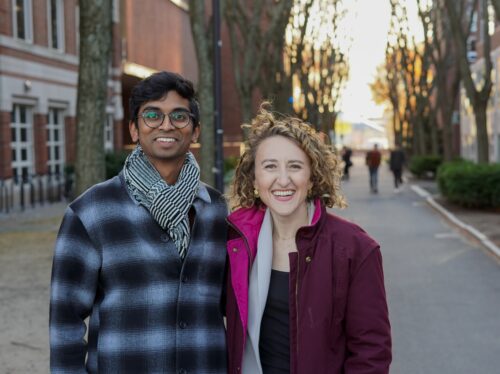In a climate of growing distrust surrounding elections, election administrators play a pivotal role in safeguarding the integrity of the electoral process. For secretaries of state in key swing states, where vote margins are expected to be razor-thin this November, this responsibility is particularly pronounced. With many Americans anxious about the security and reliability of elections, the Ash Center for Democratic Governance recently gathered the heads of elections for Arizona, Pennsylvania, Michigan, and North Carolina to discuss their efforts to ensure a smooth and fair election process.
Archon Fung, director of the Ash Center for Democratic Governance and Innovation, moderated the session, introducing the four officials as “some of the true heroes of American democracy.” Over the next hour, the group discussed the challenges of ensuring a successful election, where every vote is counted promptly and accurately, and, importantly, where the American public can trust in the process and results. “These four people are responsible for democracy in four of the states where it is under the greatest pressure this year,” said Fung. “No pressure, panelists!”
Throughout the conversation, the panelists remained optimistic and upbeat, reassuring voters that they’ve been trained for this and that America’s system of checks and balances is still humming along. When Fung highlighted recent fears about growing political violence, Michigan’s Secretary of State Jocelyn Benson replied, “As we enter these next six weeks, we are hoping for the best but planning for every contingency.” She noted that her office has prepared for possible disruptions and stressed the importance of partnerships—across states, with law enforcement, and with federal and local officials—in addressing these challenges. “The best defense against the potential for violence is to be well-prepared and committed to ensuring not just a peaceful transfer of power but also a peaceful elections process.”
Next, Fung turned to Pennsylvania Secretary of State Al Schmidt to address the challenges of running elections in what many consider the most closely watched state in the country. Noting the decentralized nature of election administration in Pennsylvania, Schmidt described his role as “being as supportive as we possibly can so that our counties can run elections smoothly.” Reflecting on the potential for counties to refuse to certify election results, as happened in the past, Schmidt promised that his department is prepared. “If it should happen … then we won’t be taking days or weeks to approach the courts for a court order,” he asserted, “[We’ll be ready] at 12:01 a.m. the next morning if they fail to fulfill their statutory obligations under the law.”
Fung then turned to Arizona, where many parts of the state have “very active and vocal groups” denying the 2022 election results. He asked Adrian Fontes, Arizona’s Secretary of State, about the steps they’re taking to combat misinformation and reach skeptics. Fontes called it a “constant and ongoing battle we’ve had in Arizona” but said that they’re continuing to fight back. He noted that recent election results in Arizona, where election deniers lost key races, reflect waning influence among those who cast doubt on the process. “When you ask the entire state of Arizona what they think, they think you shouldn’t be denying elections—not just because it’s corrosive [to] civic faith … but also because it’s bad for business.” Fung agreed, noting that “it seems like some of the things that happened in 2020 and [2022]—the institutional antibodies are kind of working.”
This month, all eyes have been on North Carolina as it grapples with the aftermath of the destructive Hurricane Helene. Karen Brinson-Bell, executive director of the North Carolina Board of Elections, described the logistical challenges of running elections in the aftermath of natural disasters. She noted that while Helene had disrupted mail services, she and her team were doing everything possible to ensure a fair and reliable election. “We prepare, and then if we have dotted the I’s and crossed the T’s and followed consistent, methodical procedures, then we’re ready to pivot when a crisis comes,” she said. “There’s a lot going on in North Carolina, but the reality is that we don’t stop elections … And at the end of the day, we are committed: every North Carolinian who wants to cast a ballot is going to be able to.”
As the event drew to a close, an audience member remarked that the panel’s discussion was deeply reassuring. Fung asked the panelists how they are communicating this sense of security to voters. In response, Fontes shared that election officials have become “explainers-in-chief” since 2020, working to educate the public on the complexities of the voting process.
The panelists closed by emphasizing that they’re all working to make the election process as transparent as possible. In Arizona, they’ve built a new warehouse where observers can watch the ballots being processed. In Philadelphia, they have a 24-hour live feed. And if you’re still concerned, said Brinson-Bell, “become a poll worker, go to the meetings, do things to get involved to understand these processes and all the layers that are in place to make sure people’ votes count and are counted accurately.






